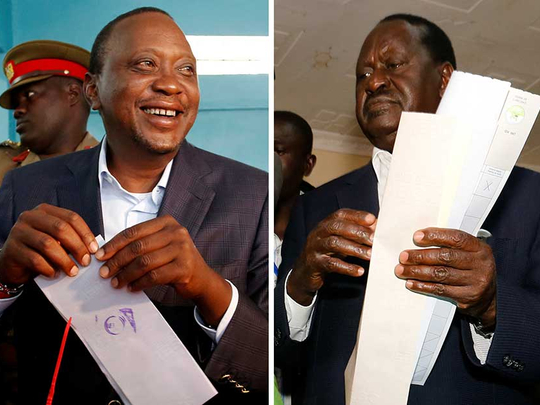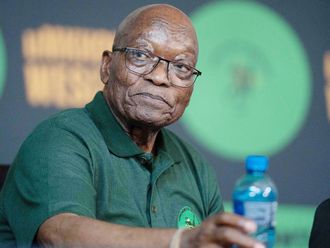
Nairobi, Kenya: Tuesday’s Kenyan presidential election is shaping up to be among the most competitive in the country’s history, pitting two longtime rivals in a contest that some worry could devolve into violence along tribal lines.
Kenya boasts one of Africa’s most important economies and has been a pillar of stability in a fragile corner of the continent. Since Uhuru Kenyatta became president in 2013, however, the country has struggled to combat deadly terrorist attacks and has been plagued by corruption scandals. Still, Kenya has experienced steady growth, and its urban centers have grown in all directions, drawing rising foreign investment.
In 2007, a dispute over the election winner flared into violence that left about 1,400 people dead, and the spectre of another clash hovers over this year’s race. Even though the country has tried to implement programs to foster cohesion and reconciliation, Kenya’s politics remain fractured along ethnic lines. Unrest is not a foregone conclusion, but events in the run-up to the election have cast doubt on the process.
Last month, a top election official was found dead, his body showing signs of torture. On Monday, in an interview with The Washington Post, opposition candidate Raila Odinga was asked whether he would discourage his supporters from violence in the event that the vote appeared rigged.
“This is not the time to deal with the solutions,” he said.
Pressed further on the issue, he said, “I don’t want to now discuss what is going to happen.”
On Monday morning, the day before the election, the typically packed streets of Nairobi were eerily quiet, with people staying in their homes and many businesses closing their doors.
Here are brief biographies of the men running for Kenya’s top job:
Uhuru Kenyatta
Kenyatta, 52, is the son of Kenya’s first president, Jomo Kenyatta, and a longtime participant in the country’s political life. In 2007, he supported Mwai Kibaki in his campaign for the presidency against Odinga. The election aftermath turned violent, with fighting mostly along tribal lines, amid allegations of vote-rigging. Kenyatta was later charged by the International Criminal Court with promoting the violence. The charge was later dropped for lack of evidence.
Kenyatta ran for president in 2013 against Odinga. An ethnic Kikuyu, Kenyatta tapped into a traditional tribal power base and promised to bring development and jobs to a country with significant problems with poverty. He won the election by about seven points. Since then, Kenyatta has faced some challenges, including the threat posed by Al Qaida-linked militants known as al-Shabab who attacked a major Nairobi shopping mall in 2013 and a college in 2015, killing 67 and 148 people, respectively.
In this year’s campaign, Kenyatta has cited as one of his main accomplishments the completion of a railway connecting the port of Mombasa to the capital, Nairobi. That project was built by a Chinese company, part of a growing partnership with China under Kenyatta. But Kenya’s unemployment rate remains high, and new jobs are mostly poorly paid positions in the informal sector. Government corruption scandals have further embittered many citizens. But with elections dictated largely by tribal alliances, Kenyatta might still have the votes he needs to win.
Raila Odinga
Odinga, 72, is also a member of Kenya’s political elite. His father was the country’s first vice-president, serving under Jomo Kenyatta. In the early 1980s, the younger Odinga was accused of plotting to overthrow President Daniel Moi and sentenced to six years in prison. He was released in 1988 but subsequently imprisoned twice more after campaigning to end one-party rule. When he was finally freed in 1991, many Kenyans — particularly in his Luo tribe — saw him as a principled fighter against a repressive state. His own political career developed quickly, and he would go on to run unsuccessfully for president three times, beginning in 1997. His narrow loss in 2007 precipitated large-scale post-election violence.
Odinga is probably running for the last time, which has added urgency to his campaign. He has emphasised the lack of economic improvement under Kenyatta, and the need for more employment opportunities, particularly for young people. In 2013, when he contested the election results, he turned to Kenya’s courts. This time, he said he has no faith in the courts to resolve an electoral dispute, and some worry that his final push for the presidency could result in clashes in areas where Luo and Kikuyu tribes live in proximity.












